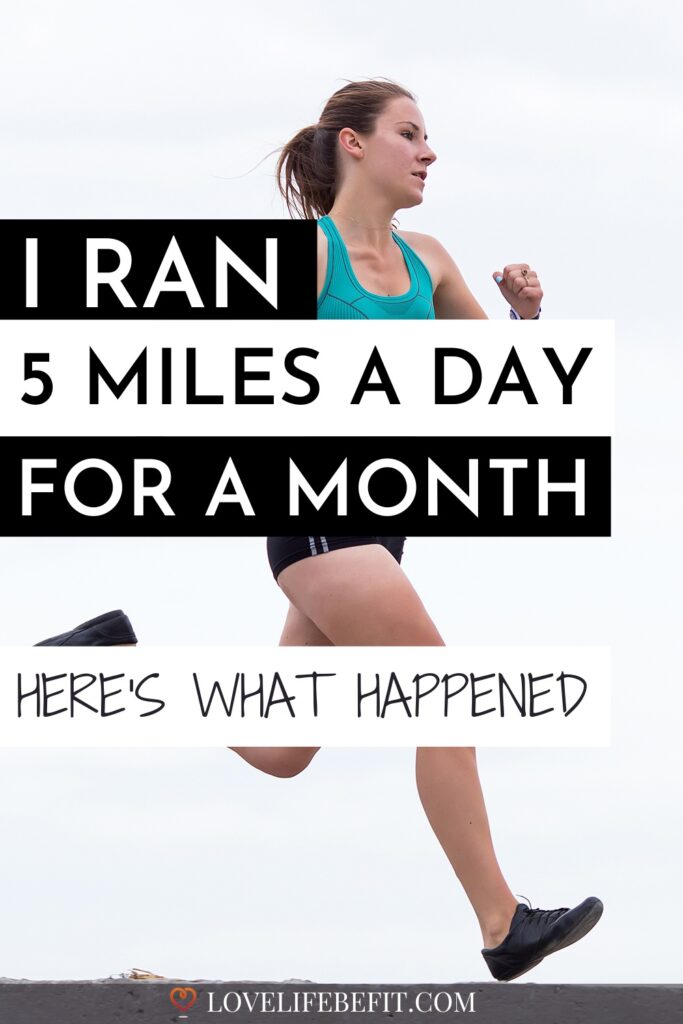I Ran 5 Miles A Day For A Month. Here’s What Happened
So here goes. Running 5 miles a day. What happened when I tried to run 5 miles a day for a whole month? What are the pros and cons? Is it something anyone can try? Will it transform your running or even your life?
Running every day is a controversial topic. Not everyone’s in favor and after the first week, your body will be crying out for a rest day. These are some of the things that will happen if you start running 5 miles a day:
- It will help with weight loss.
- Expect to take 30 to 60+ minutes to run 5 miles depending on how fast you run.
- It’s a good idea if a regular run helps your running motivation.
- It’s a bad idea if you’re injury-prone or brand new to running.
- Running the same 5-mile session every day will limit your ability to improve as a runner.
Read on to find out more. Is it okay to run 5 miles every day and what will it do to your body?

Should I Run 5 Miles A Day?
There’s something pure and simple about running 5 miles a day. There are no complicated training plans, no decisions about how far or how fast you should be running, just the routine of a 5-mile run.
So let’s dive into the pros and cons of running 5 miles every day and see if it’s the right choice for you. Let’s start with the pros…
Pros Of Running 5 Miles A Day
#1 It’s good for your health
If running every day helps you build a regular fitness regime, your health will benefit. Just running one or two miles a day is enough to make a difference.
Your cardiovascular health will improve and you’ll reduce your risk of cancer and type II diabetes.
#2 You’ll lose weight
Running is one of the best ways to burn calories. By running 5 miles a day, you’ll burn about 100 calories per mile and a total of 3,500 calories a week. That’s equivalent to one pound of body fat.
This is based on the big assumption that you don’t replace all these calories by eating more. Running can make you really hungry and it’s easy to reward yourself with sticky treats for all that running.
Fill up with healthy post-run snacks full of lean protein, whole grains, lots of vegetables, and some fruit.
You can improve your weight loss by adding in some faster-paced running intervals once or twice a week and making time for strength training such as these bodyweight exercises for runners.
Find out more about running for weight loss.
#3 It’s good for your running
There’s a saying practice makes perfect and it certainly applies to running. Run regularly and your running will improve.
You’ll become stronger, your body will adapt to the increased mileage and your running form will become more efficient. Frequent easy-paced running creates good runners.
5 miles a day will build a solid running base. It’s a good base for half marathon or marathon training.
#4 It gives you time to yourself
Pulling on your running shoes and heading out the door can be the best time of the day. It’s your time!
In our hectic lives, we often feel weighed down by work and family commitments. Taking the time to run 5 miles a day is one hour of pure “me-time”. Just you and the road or trail.

#5 It helps with mental health
Running will improve your mood. It’s not just about a runner’s high, regular paced running is a good way to work through problems and put life in perspective.
You’ll stop sweating the small stuff and the fresh air helps you sleep better.
#6 It encourages regular running
Most of us are full of good intentions that fall by the wayside when life gets in the way. Having a set distance to run every day, often at the same time, makes it easier to stay on track.
There’s no thinking involved. When I was running 5 miles every day I knew that at 3pm, whatever the weather or the type of day I’d been having, I would be out running. No excuses.
#7 Not everyone wants to race
There are times in my life when I enjoy racing, at other times I just want to run. I know many runners feel the same way.
Running is about more than your next race. The satisfaction of completing a running streak can be just as enjoyable.

Cons Of Running 5 Miles A Day
#1 You’re more prone to injury
This is especially true if you’re a new runner, but injuries are also a risk if you’re an older runner, you’re on the heavy side or you have a history of running injuries.
Some people are more prone to injury than others and need those rest days. If this sounds like you, target running 5 miles for 5 days a week such as work days. You’ll still get all the benefits and your body gets time to recover.
#2 It’s too far if you’re a new runner
No one should jump straight into running 5 miles a day. If you’re new to running, you need to build up to running 5 miles a day.
Start with a distance you can run easily. It could be 2 or 3 miles. Gradually increase the distance week by week until you’re running 5 miles a day.
#3 Your running will plateau
To improve at running, you need to keep challenging your body. Running the same routine day after day can become easy and you’ll stop improving as a runner.
When your running plateaus you may stop losing weight. Continually challenging your body is just as important for weight loss.
#4 There’s a risk of over-training and burnout
Rest days help you recover and return to your running with renewed energy and enthusiasm. When you run every day you risk over-training and you can become bored and disillusioned with your running routine.
Often it’s better to mix up your running with different sessions to keep your training fresh and challenging.
#5 There’s no time for cross-training
Cross-training for runners can help to strengthen your body and make you a better runner. When you’re running the same session every day, there’s little time for any other type of training.
#6 You’ll stop improving as a runner
If you want to improve as a runner and enter races, running 5 miles a day is of limited benefit. It can be a good way to build a running base in between training goals, but it takes a more structured training plan to train for a race.

How Long Does It Take To Run 5 Miles?
It all depends on how fast you run! For a beginner runner, a pace of 10 to 12 minutes per mile is typical so a 5-mile run will take 50 to 60 minutes.
Experienced runners may run at a much faster pace such as 7 to 8 minutes per mile. At a 7-minute mile pace, your 5-mile run will take only 35 minutes.
If you’re a slow runner, don’t worry about it. You’re still faster than anyone sitting on the couch! A 15-minute-per-mile pace is still moving. Just allow 1 hr 15 minutes to complete the distance.

How Do I Know If I’m Ready To Run 5 Miles A Day?
If you wake up one morning and think; “I haven’t run or exercised for years but I’m going to start running 5 miles a day”, you’re in for a shock.
Expect to be very sore and possibly injured by the end of the first week.
This challenge is not for complete beginners.
Running 5 miles a day is a challenging but reasonable target for someone who’s completed their first 10K, has been running for at least 3 months, and typically runs 20-25 miles a week.
If you’re an occasional runner but still want to run 5 miles a day
- Run slowly and add walk breaks. Don’t try and run the whole 5 miles every day.
- Don’t ignore pain. Take a rest day and seek some medical advice.
- Rehydrate fully and focus on your recovery after each run. Sit with your legs raised and aim for good nutrition to help your body recover.

Here’s What Happened When I Started Running 5 Miles Every Day
I’d never been a fan of daily running but to write this article I set myself a target of running 5 miles a day for a month. I wanted to know what it would do to my body.
I didn’t have any strong views against running every day – I just find I run better when I add rest days to my training schedule. Yet even on rest days I normally go for a walk or do some yoga.
At the time I’d lost my mojo for running: it had become a bit of a chore. It can happen when the weather’s bad or I’m distracted by other things in my life. Sometimes I just need a wake-up call to remember how much I LOVE to run. I reckoned knowing I had to go for a run every day – NO MATTER WHAT – would help.

So here’s what happened when I started running 5 miles every day for a month:
I improved my motivation for running:
My legs felt dead for the first week so I alternated easy runs on the flat with my normal hilly run. It really helped to know I had to go out for a run whatever the weather. I couldn’t talk myself out of running!
My running pace was very slow to begin with but by the second and third week my body adjusted to the extra miles.
I was ravenous at first and found it very hard not to eat everything in sight! Eventually, my appetite went back to normal but I didn’t lose any weight in the first two weeks.
In week three I lost 1 pound and in week four I lost 2 pounds. It could have been more but I was still eating a few extra treats.
Running Niggles Seemed To Clear Up Running Every Day
At the start of running every day, my knees were a bit sore from a steep indoor climbing session. I could feel a few niggles running but they eased off once I warmed up. Normally I’d take a day or two off training.
I realized after a few days my left knee had recovered without taking a rest and by the second week, both knees were sound. Maybe sometimes I’m too quick to take time off when my body doesn’t really need it.
By week four I got bored of running 5 miles every day and started mixing things up. I had a couple of longer 8-mile runs interspaced with short easy 1-2 mile days.
I Only Took One Day Off Running In A Month
In one month of running, I only took one day off. I felt terrific, lost a little weight, and felt I was running faster. It’s certainly worth trying if you’re a reasonably experienced runner. If you’re new to running, start by running a mile a day and build up the distance gradually.
6 months later I’m feeling good about my running. I’m running a lot more frequently than usual – not always every day but if I don’t manage a run I normally fit in a 5-mile walk. Apart from a few small niggles – less than usual, I’ve stayed injury-free.
I Lost Some Weight
Did I lose weight running every day? Yes but not a huge amount. I’ve been running for so many years my body adapted quickly to running more frequently. Unless I’m training hard for an event and really increasing my mileage, I don’t lose a lot of weight just from running. Watching my diet, and avoiding too many treats, has the biggest impact on my weight.
That doesn’t mean running frequently won’t help with weight loss. It’s just you can’t expect to eat carrot cake after a run and lose the pounds! I’m still a healthy BMI and that’s all that matters to me.









